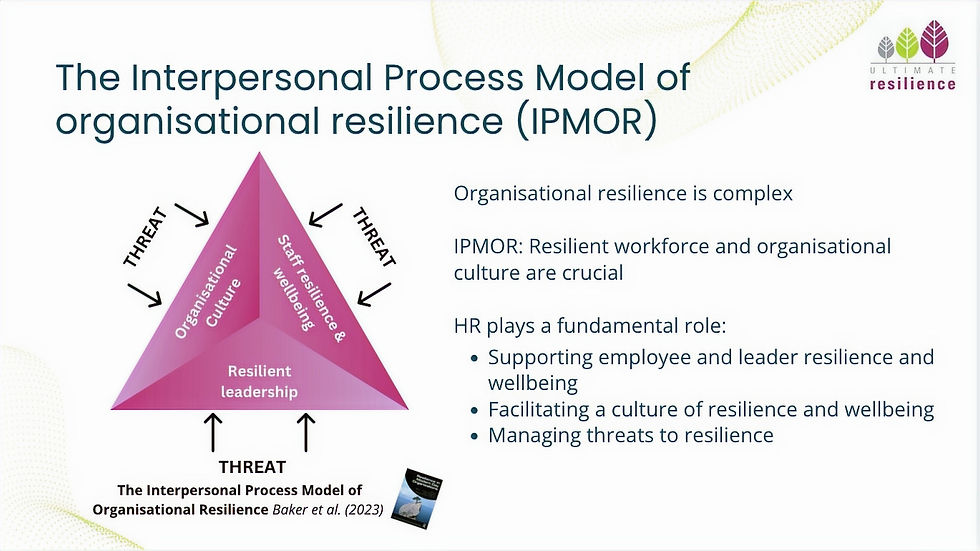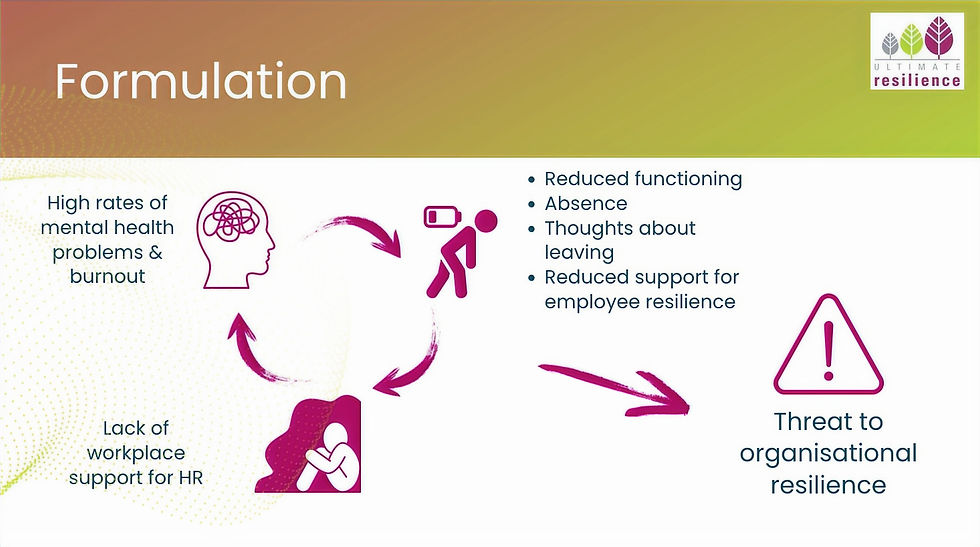When HR Struggles: The Hidden Threat to Organisational Resilience
- Felicity Baker

- Aug 1, 2025
- 4 min read
Updated: Aug 4, 2025
I’m Dr Felicity Baker, co-founder of Ultimate Resilience. For over a decade, Dr Jo Burrell and I have worked with businesses and organisations to strengthen employee mental health and resilience through training, coaching, and supervision.
In that time, one group has stood out for the unique role they play, and the unique risks they manage: HR professionals. Here is a summary of my presentation at the EAWOP2025 conference on what happens when HR struggles and the hidden threat to organisational resilience .

Why HR Matters for Organisational Resilience
Organisational resilience is never simple. It depends on how well employees, lead
ers, and the wider culture can withstand and adapt to challenges. That’s why my colleagues and I developed The Interpersonal Process Model of Organisational Resilience, described in the book Resilience in Modern Organisations.

In this model, resilience isn’t just about individual coping—it’s a system supported by:
Employee resilience
Leader resilience
Organisational culture
When any of these falter, the whole organisation is at risk. And at the centre of holding this together, often quietly and behind the scenes, sits HR.
HR professionals are tasked with supporting employees and leaders, nurturing a healthy culture, and managing threats to resilience across all levels of the organisation. But what happens when HR themselves begin to struggle?
The Untold Story of HR Burnout
In our work at Ultimate Resilience, we often noticed that HR professionals commissioned support services for employees, but rarely accessed those services themselves. Yet many quietly admitted to stress, exhaustion, and even burnout.
Take Anna (name changed), an HR professional working in a UK education trust.
She was one of only two HR staff managing a merger that came with huge demands, unclear role boundaries, and staff expectations that went far beyond HR’s remit. On top of this, she was supporting a number of staff with severe mental health difficulties—including those with clinical depression and experiencing suicidal thoughts—without clear policies, training, or professional support.

On a personal level, Anna was relatively inexperienced, anxious, and struggling to assert boundaries. Unsurprisingly, the strain was overwhelming. And despite her love of her job, she found herself thinking about leaving the profession.
Her story is far from unique. We began to wonder—was this just what we were seeing in our own clients, or was it part of a wider, systemic issue?
Looking for Evidence—and Finding a Gap
When we searched the literature, we were surprised. Despite the central role HR plays in workforce wellbeing, no research had been conducted on HR professionals’ own mental health.
There’s a wealth of studies on how HR supports others, but almost nothing on how HR are supported themselves. Yet HR professionals are employees too. They experience stress and strain just like anyone else. And if their mental health suffers, the impact on organisational resilience could be significant.
So we decided to investigate.
A Survey of HR Mental Health
Following an initial pilot in 2024, earlier this year, we surveyed 1,421 HR professionals across the UK. Using standardised measures of wellbeing, anxiety, depression, and burnout, alongside questions about support, absence, and work functioning, we set out to map the mental health landscape of HR.

The results were striking.
High levels of psychological distress—significantly higher than the general population.
Burnout rates that suggest something about HR work itself may be harmful to mental health.
Functioning at risk—distress at levels high enough to affect HR’s ability to do their jobs.
Low levels of perceived support, linked to more absences and more thoughts of leaving the profession.
In fact, LinkedIn polls of HR professionals that we ran alongside the survey showed that 91% of respondents did not feel HR are “equipped to deal with the psychological challenges of their role.”
These challenges are not trivial. They often involve complex interpersonal situations and high-stakes conflict, mirroring the intensity of what clinical psychologists (trained mental health professionals) might face—without the training, supervision, or support structures clinicians typically receive.
A Vicious Cycle: The Hidden Threat to Organisational Resilience
The implications are serious. More mental health problems mean lower functioning. Lower functioning makes HR less able to support others, which in turn increases the strain on them. Without intervention, this cycle reinforces itself, posing a growing threat to the resilience of the organisation as a whole.

What Needs to Change
Breaking this cycle requires support at three levels:
Individual – HR professionals need space to notice their struggles, normalise help-seeking, and access reflection and growth opportunities.
Organisational – Employers must recognise HR’s emotional labour, embed robust systems of support, ensure sustainable workloads, and provide fair recognition.
Professional – HR bodies should promote supervision and impartial support, just as clinical services do. In healthcare, regular supervision has been shown to mitigate burnout, improve retention, and strengthen outcomes. HR deserves no less.
In our work with Anna, for example, supervision helped her set boundaries, implement risk policies, notice early stress signs, and develop healthier coping strategies. These small shifts made her more effective in her role, and ultimately reduced the threat to her organisation’s resilience.

Moving Forward
Our survey is just the beginning. While the sample was self-selecting, it raises an urgent question: if HR is struggling at scale, what does that mean for the future of workplace wellbeing and organisational resilience?
It’s time to make sure the people holding the resilience of organisations together are themselves supported to stay resilient.
To find out more about our work with HR professionals and how this can support the functioning of your wider organisation get in touch.




Comments